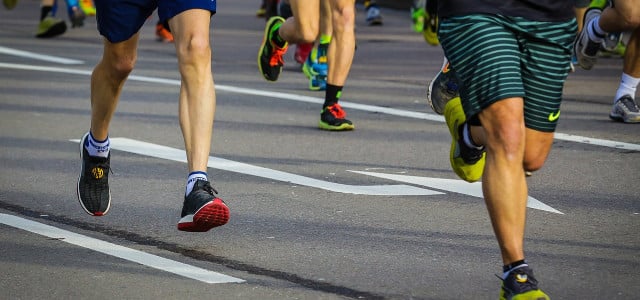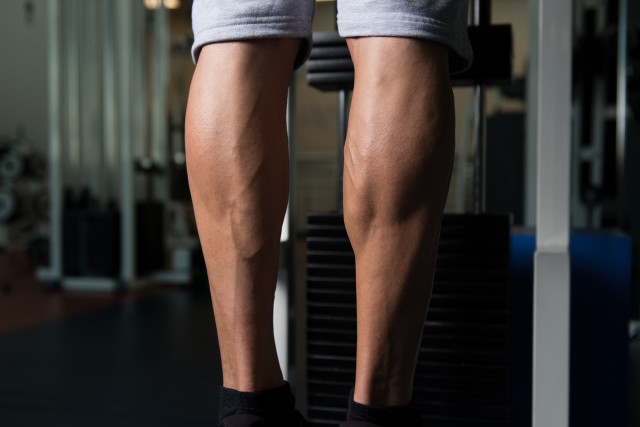
Calf cramps cause severe pain. The causes are often poor circulation or a mineral deficiency. Here you can find out how to relieve and prevent cramps.
Calf cramps are caused by the muscles in the leg suddenly contracting. Sometimes the pain goes away on its own after a while, and stretching can also help. Calf cramps often occur after exercise or at night. In most cases, calf cramps are harmless. However, they can also indicate a mineral deficiency or an illness.
This is how muscle cramps in the calves occur

(Photo: Colourbox.de)
There are different types of muscles in the human body. These include the so-called skeletal muscles: These are responsible for the body’s movements and can cramp. The heart, for example, is a separate muscle that cannot cramp at all. When we talk about muscles, we usually mean the skeletal muscles.
The fibers of a muscle are connected to the nervous system; the nerve cells in turn receive stimuli from the brain. When you move, the cells receive instructions from the brain to contract. The muscle then tenses. Normally the tension is released again as soon as the muscle is no longer used. A relaxation phase occurs.
When a cramp occurs in the lower leg, the muscle receives an involuntary nerve stimulus. It contracts and can no longer relax. This is how a cramp occurs.
Causes of calf cramps

(Photo: CC0 / Pixabay / silviarita)
The causes of calf cramps are often harmless and easy to treat. In many cases, a disturbance in the electrolyte balance triggers cramps, according to the Orthopedic Joint Clinic. This means that there is a lack of important salts and minerals in the body. This affects the excitation level of the muscle fibers, causing calf cramps.
These are the reasons for an electrolyte deficiency:
-
Dehydration can be the cause of leg cramps. The body needs sodium, potassium and magnesium for nerve transmission. Therefore, the body needs fluids to keep the electrolytes balanced.
- If you don’t drink enough water, vomit, or have diarrhea, your body can quickly become dehydrated. Heavy sweating also leads to a lack of minerals. That’s why it’s especially important for athletes to drink enough during their workout.
- A mineral deficiency can also be caused by an unbalanced diet, diets or alcohol.
- Some medications can also affect electrolyte balance, including painkillers, antidepressants or the contraceptive pill.
But there are also other causes for cramps in the lower leg:
-
Calf cramps at night can indicate a lack of fluids while sleeping or a magnesium deficiency. Overexertion during the day can also cause the muscles to cramp at night.
-
Pregnant women sometimes experience leg cramps. These can occur because pregnant people have an increased need for minerals such as magnesium, sodium and potassium. In addition, the uterus can affect blood circulation in the body, which can lead to cramps.
- Incorrect foot positioning or unsuitable footwear can cause calf cramps.
The causes of cramped muscles are often harmless and not a cause for concern. In a few cases, however, calf cramps can indicate an illness. You should seek medical help if the cramps become more frequent or do not go away on their own – or if a cramp is unusually strong and no medication provides relief. In this case, diabetes, a thyroid dysfunction or kidney disease may be the cause.
Treating cramps in the lower leg: tips for relief and prevention

(Photo: CC0 / Pixabay / dbreen)
Most of the time, the actual cramp only lasts a few seconds or minutes. The muscle tension then subsides on its own. But sometimes you can still feel that your calf is hardened a few days later. If your calf cramps are not caused by illness, you can relieve the pain with simple tips, according to the Joint Clinic:
-
Stretch your calf to relieve the cramp. To do this, put your leg down, press your heel to the floor and pull your toes up. This will stretch your lower leg and relieve the pain.
- Try putting weight on your leg. The strain will stimulate blood flow to the muscles and relieve the cramp.
-
Gently massage the tense areas to loosen the muscles.
-
Warm calf wraps help with tense muscles. Pour warm water over a towel and then wring it out vigorously. The warm towel loosens the tense muscles and provides relaxation.
- Warm baths also relieve tension and cramped muscles. You can also easily make your own bath additives with natural ingredients.
You can also prevent calf cramps by:
- After a sporting session, take an appropriate break for regeneration.
- Make sure you eat a balanced diet to replenish the mineral levels in your blood. Whole grain products and nuts are particularly good for replenishing depleted magnesium stores after exercise. In this article, you will learn what else a magnesium deficiency can lead to.
-
Drink plenty to prevent dehydration. After exercise, isotonic drinks such as non-alcoholic beer are good for absorbing lots of electrolytes. You should stay away from alcohol as it can promote magnesium deficiency. Coconut water is also advertised as a mineral-rich refreshment for athletes. However, the sodium content is too low, so the high potassium content can even lead to heart problems – not to mention the poor ecological balance.
Read more on Techzle\.com:
-
Foot cramp: causes and how to solve it
- Drinking water: this much is healthy
- These 7 medicinal plants are natural painkillers and antibiotics
Edited by Nora Braatz